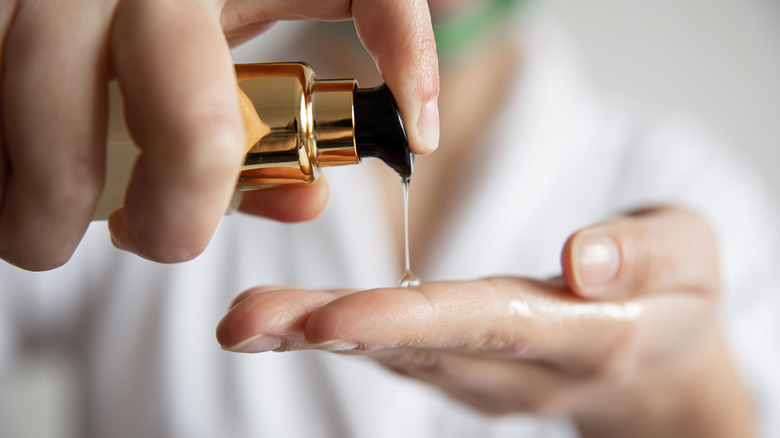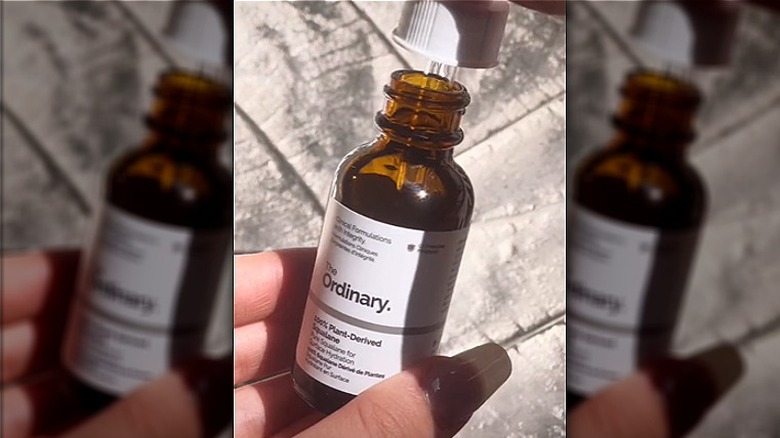Squalene Is A Skincare Favorite But It's Not Always Sourced Sustainably. Here's What We Know
Seasoned skincare fans might recognize this frequently used ingredient: squalene. According to Healthline, squalene is a biogenic lipid that can be found in several plants and animals, including humans. Squalene accumulates in the liver and aids in lowering cholesterol and triglycerides.
Now, what does that have to do with skincare? Well researchers have found the sebum our skin produces, aka the oil that is critical for keeping our faces moisturized, is made up of around 12% squalene, but over time, that concentration declines. As a result, those who want to maintain moisturized skin should look to external forms of squalene to use in their routine.
When squalene is hydrogenated, it becomes squalane — with an "a." This is the stuff found in skincare products. It's more shelf-stable than squalene, which is quickly diminished when exposed to oxygen. A natural, lightweight emollient and antioxidant, squalane is touted as a safe ingredient to moisturize your skin, as well as to treat skin damage and inflammation.
A deeper look into the origins of squalane, and by that extension, squalene, however, reveals a surprising fact about the ingredient that is cause for concern.
The deep problem with squalene
Squalene is found in large amounts in shark liver oil, and consequently, the animal is slaughtered for the biogenic ingredient. Speaking with the Cleveland Clinic, dermatologist Dr. Vijs says the ingredient can be cause for ethical and environmental concern. "There are concerns about animal welfare. Sharks have increasingly been poached or trafficked illegally for the squalene that's found in their livers," Dr. Vij explains. "This isn't environmentally conscious or sustainable."
Conferring with Vice, marine scientist Andrew Chin expresses that sharks are critical to the health of our oceans. "Sharks have been around for over 400 million years and play such an important role in our oceans and marine ecosystems," he begins. "But a lot of species are now extremely vulnerable to open exploitation." He relays a dire statistic: more than one third of shark species could become extinct, should such poaching continue.
So how can consumers know where their squalene is sourced from, should they want to opt out of the practice? According to Chin, "We know very little about the shark liver oil trade because products containing squalene are poorly documented." The FDA does not approve ingredients in cosmetics before they go on the market, meaning it is entirely up to brands to be transparent, or otherwise, about where their ingredients come from.
Alternatives to animal-derived squalene
As the massive market for squalene and sustainable beauty products continues to grow, the demand for plant-derived squalene and squalane has increased. Many skincare brands haven taken note, moving toward selling these animal-free alternatives. Speaking with Allure, Dr. Marisa Garshick says, "The squalane in skin-care products is now being derived mostly from plants such as olives and rice bran."
According to a global forecast report published by Markets and Markets, synthetic squalene is expected to see a huge rise in prevalence in the coming years. "The biosynthetic segment is projected to be the fastest-growing source type, in terms of value, during the forecast period," per the report. Fermented sugarcane and modified yeast, for example, can be processed to produce squalene and squalane, which is great news for both businesses and the environment. Beauty brand Biossance points out that switching to this method of deriving squalene has the potential to save thousands of sharks every year.
This is also great news for consumers, because as noted in Harpers Bazaar, animal-free versions of squalene are just as effective of a skincare ingredient as the squalene sourced from sharks.
Be sure, however, to check the website of your favorite skincare company for more information on where they may source ingredients from, and if they provide certificates of analysis (COA) that the claims they make regarding their products are truthful.


